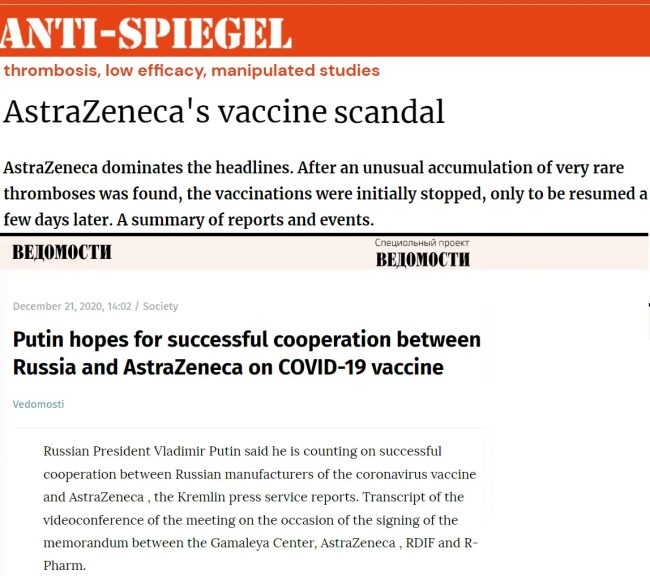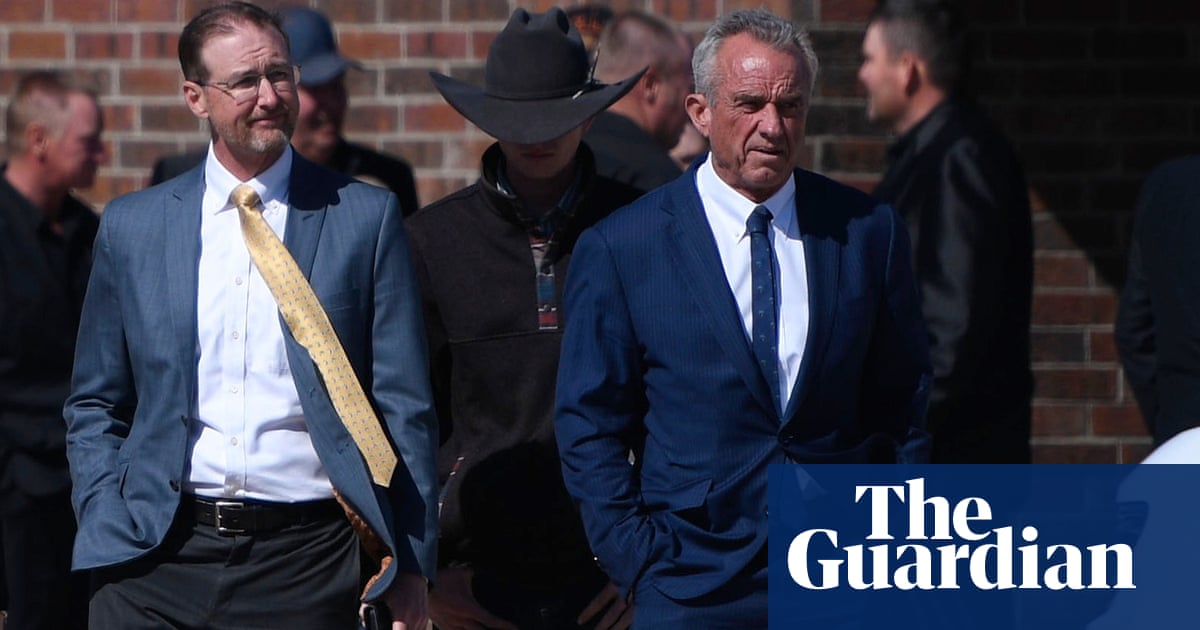Russia’s Great Reset: Facing Reality
Riley Waggaman
A reader recently alerted me to an intriguing article published by Thomas Röper, the curator of Anti-Spiegel.
In it, Röper argues that Ernst Wolff—an authoritative voice on Great Reset shenanigans—is wrong to list Russia as an active participant in the COVID-triggered New Normal.
I would like to offer a different perspective on this subject, particularly because many of the arguments put forward by Röper have become commonplace on Twitter, Telegram, and podcasts that nobody listens to. To Röper’s credit, he took the time to actually write down his thoughts.
Röper and I have exchanged “blog critiques” in the past; in December, he critiqued an article I wrote pointing to links between Davos and the financiers and developers behind Sputnik V. I then critiqued his critique. Blogging is very exciting.
I want to stress that this article is not meant as a personal attack on Röper; I’m only interested in exploring his ideas.
Actually, I’m rather fond of Röper. He possesses a rare quality—he’s open to dialogue. He even updated his December article to include my response to his critique.
Quite sporting of him—practically unheard of in the age of ego-driven, vapid Internet Punditry.
My (probably naïve) hope is that this article will encourage “Russia watchers” to think more deeply about the topics discussed below.
Putin & the World Economic Forum
Röper begins by outlining his views on how western global power structures operate, and why he doesn’t think Putin (or Russia) is part of this network. I will return to this part of his argument later.
He continues by pointing out that Wolff incorrectly claims Putin is an alumnus of the WEF’s Young Global Leader program.
Wolff’s claim likely stems from a viral 2019 video in which Klaus Schwab lists Tony Blair, Angela Merkel, and Vladimir Putin as graduates of his Young Global Leaders club.
All available evidence suggests Schwab misspoke. As Anti-Empire reported in December 2021:
Young Global Leaders” must be 38 or under when they are admitted. At 38, Putin would have still been in the KGB in the dying days of the USSR in 1990.
Also, WEF didn’t start the Young Global Leaders program (as “Global Leaders for Tomorrow”) until 1993 when Putin was already 41.
Röper correctly notes Putin is not listed on the program’s website. And with good reason: Russia’s president was too old to qualify when the WEF began its infamous leader-grooming initiative in 1993.
“Since Putin is not included in the lists of Schwab’s programs and Schwab’s statement can also be interpreted differently, I see no proof or even serious indication that Putin was in these programs,” Röper writes.
I don’t disagree; but what Röper fails to mention is that Putin’s relationship with Klaus Schwab predates the creation of the Young Global Leaders program.
Speaking at the Davos Agenda online forum on January 29, 2021, Russia’s president greeted the WEF chairman as “dear Klaus,” and recalled their decades-long relationship:
I have been to Davos many times, attending the events organized by Mr. Schwab, even back in the 1990s. Klaus [Schwab] just recalled that we met in 1992. Indeed, during my time in St. Petersburg, I visited this important forum many times.
Vladimir Putin was not a Young Global Leader and it’s misleading to label him as one. But it’s equally misleading to pretend Putin does not have a long history with Schwab and the World Economic Forum. Actually, this relationship began a year before the Young Global Leaders program even existed.
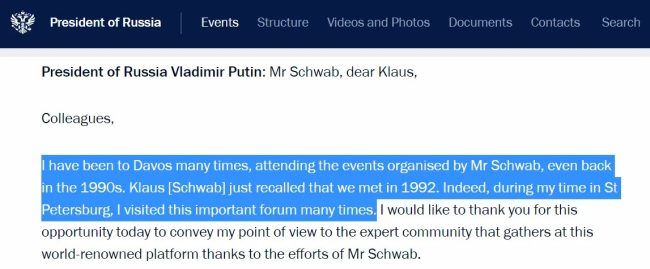
Source: Kremlin.ru
In 1992, Putin was working for St. Petersburg mayor Anatoly Sobchak as the head of the city’s Committee for External Relations—a post he held until Sobchak lost the St. Petersburg gubernatorial election in 1996.
Part of his job entailed promoting international conferences and attracting foreign investment in St. Petersburg. It’s reasonable to assume this is how Putin first appeared on Schwab’s radar.
At the same time, let’s not forget that Putin was not exactly a high profile official during his time in St. Petersburg. In fact, the Russian president claimed he worked part-time as a taxi driver to make ends meet.
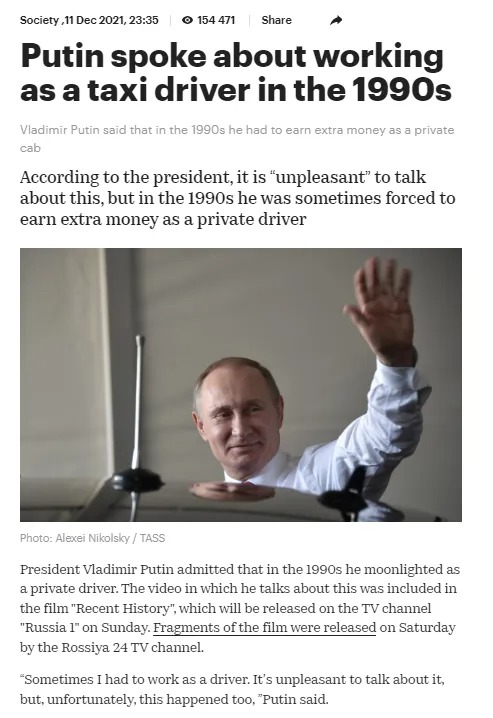
Source: RBK
None of this would matter if Putin—who over a period of three years went from a minor official working a side job, to Acting President of the Russian Federation—was an outspoken critic and opponent of Davos. Alas, the exact opposite is true.
Meeting with Schwab in St. Petersburg in November 2019, Putin said the World Economic Forum “supports people striving to work openly and in line with current international law and promotes contacts between business and government officials.”
Russia’s president added:
This is why we have always supported and will continue to support our relations with the forum you founded. Naturally, Russian representatives have always attended and will attend your events.
In turn, we conduct similar events that are primarily aimed at establishing business contacts with Russia’s partners. You know we have the Economic Forum here in St. Petersburg as well as different events in the Far East, Siberia and southern Russia. So we are following your example. I hope that we are not letting you down and that we are working in unison.
Röper is highlighting a technicality (Putin wasn’t a Young Global Leader) while ignoring the fact that Schwab and Putin go back some thirty years—when Putin was a non-entity in Russian politics. So what exactly is Röper arguing?
Russia’s digital ruble: different from other CBDCs?
Röper then turns his attention to Wolff’s criticisms of the digital ruble, arguing that Russia’s centralized digital coin is fundamentally different from what the European Central Bank (ECB) is proposing.
According to Röper, the introduction of an ECB coin would usher in a “total surveillance state, because you couldn’t even buy a pack of chewing gum without it being registered … The ECB coin—along with a ban on cash—would not only be the total surveillance state, it would also be the ultimate repressive state.”
But the situation is different in Russia, Röper claims.
“In Russia, no one is thinking about abolishing cash, and the use of cash in Russia—in contrast to the West—is unrestricted … There are no restrictions on using cash in Russia,” he writes.
This is not true. There are already cash bans in Russia—part of an aggressive push towards “digitalizing” the economy.

Source: Interfax
Since June 2022, commuters have been barred from using cash to pay for bus fares in the Moscow region.
Authorities cited safety concerns (bus drivers shouldn’t be counting change while on the road) as the primary motivator behind this prohibition. But there were other justifications given.
A regional union leader claimed the coronavirus “pandemic” showed that viruses could be easily transmitted through cash, and that the new cash ban would help “avoid the spread of various infections and diseases.”
This isn’t a policy unique to the Moscow region.
In March 2022, Russian media revealed that cities across the country were introducing cash bans on public transport.

Source: tr.ru
“The trend of transferring fares to cashless payments can be traced throughout the country. In St. Petersburg this year, the vast majority of bus routes will be completely transferred to contactless payment,” tr.ru reported.
In some regions, commuters are penalized when they try to use cash. Vologda Oblast announced in January 2022 that the fare for trolleybuses would cost 30 rubles—but 32 rubles if you pay by cash.
Russia is actually a trailblazer in developing cashless payment systems.
In 2015, Sberbank, the country’s largest bank, launched Ladoshki (“Little Palms”), a biometric payment system for schoolchildren:
“To pay for lunch, the student puts his hand to the scanner on a special machine, selects a dish from the menu, and the money is automatically debited from the account attached to the biometrics.”
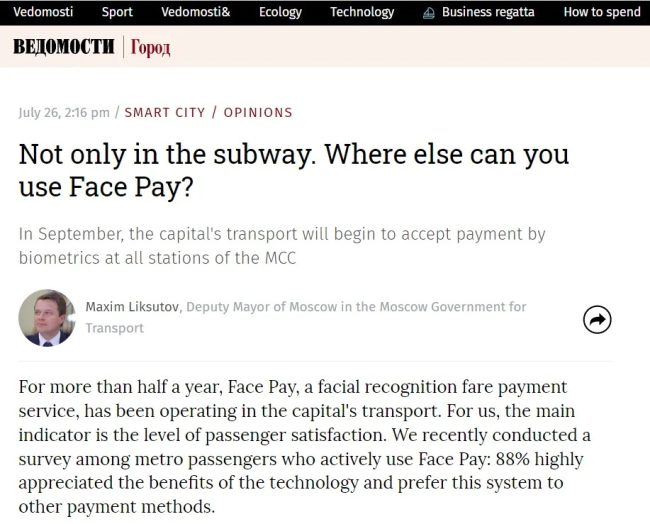
Source: Vedomosti
In July 2022, Moscow unveiled plans to expand its biometric Face Pay system for metro commuters.
Maxim Liksutov, deputy mayor of Moscow, boasted that “facial recognition fare collection systems are being implemented in China, but we are ahead.”
The Face Pay system is now being tested in St. Petersburg. Samara is also considering the introduction of a biometric payment system for public transport.
Face Pay is still voluntary, of course. For now.
What exactly makes Röper so confident that cash will never be banned in Russia? Restrictions on cash are already in place—does he believe this trend is going to suddenly reverse?
Even in the “most cashless” countries (Sweden and other strange places), cash hasn’t been outright banned. Completely phasing out cash will probably take years—but again, where is the evidence that Russia is resisting the (global) transition to cashless systems?
Röper is claiming Russia has no restrictions on using cash—even though it does, and even though it is aggressively pursuing biometric payment systems—and therefore the digital ruble will be less oppressive than other CBDCs. I don’t find this argument very convincing.
Röper then explains why he thinks the digital ruble can’t be compared with other central bank tokens: “The Russian central bank ruble, which is under consideration, is to become a covered currency. Behind every central bank ruble should be a basket of commodities (gold, oil, etc.).”
Sadly, there are no such guarantees from the Bank of Russia. (If there is, please find me the press release.)
For the sake of argument, let’s assume the digital ruble—which will begin a pilot program using “real clients and real operations” next year, without being tied to commodities—will be linked to precious metals or other resources.
How would this negate the assault on personal liberties and privacy that would inevitably occur with any other CBDC? The digital ruble, like all CBDCs, is a centralized programmable digital currency that can be used to control people. Is Röper suggesting otherwise?
In December 2021, blockchain consultant and cryptocurrency researcher Denis Smirnov told Vedomosti that for ordinary Russians, “the introduction of the digital ruble is the materialization of the most terrible scenarios described by science fiction writers in dystopias.”
“According to the expert [Smirnov], with the advent of the digital ruble, absolute transparency will reign in the field of personal finance, which means that the human right to privacy will be under attack,” the paper wrote.
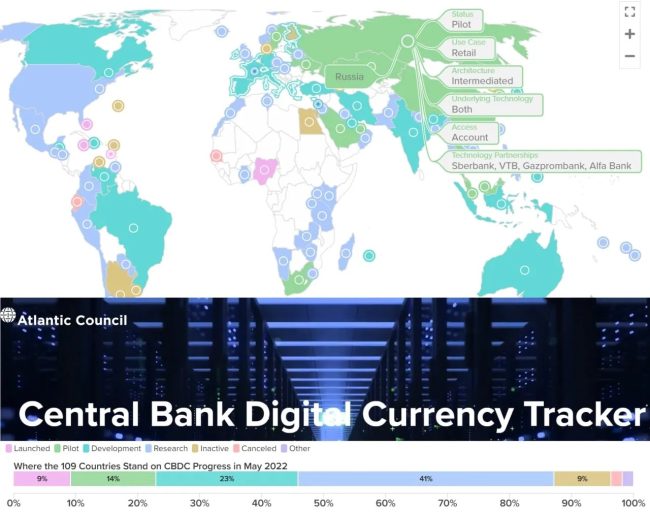
According to the Atlantic Council’s CBDC tracker (lol), Russia is winning the CBDC arms race against US/NATO. (source)
The Bank of Russia doesn’t even try to hide the terrifying “potential” of its digital ruble.
Russia’s CBDC “will permit better traceability of payments and money flow, and also explore the possibility of setting conditions on permitted terms of use of a given unit of currency,” Bank of Russia Deputy Governor Alexey Zabotkin said while speaking at at Cyber Polygon 2021 (which was co-hosted by the WEF and Sberbank).
According to Röper, an ECB digital currency would likely represent “the ultimate tool of control and oppression.”
In Russia, on the other hand, “the central bank ruble would only be a voluntary alternative to cash,” he writes.
How does Röper know this?
Putin’s speeches: Actions speak louder than words?
Finally, Röper points to Putin’s fiery rhetoric as proof that there’s no spooky Davos-inspired funny business going on in Russia.
“Russia has openly declared war on the Western system, in which the oligarchs’ foundations hold the de facto power,” he writes, adding:
There are countless speeches in which Putin has spoken out against this Western economic model. He used to be diplomatic about it, but now he shows almost no consideration. On August 16, Putin gave a speech that I translated. In his speech he became clearer than ever before.
Putin spoke openly of the fact that politicians (democratically elected) do not govern in the West, instead he spoke of “ Western globalist elites ”—a clear paraphrase of the people I have referred to here as “Western oligarchs”. Putin spoke of them standing for a model “that makes it possible to parasitize the whole world”—in plain language he was saying that a few western oligarchs are sucking (“parasitizing”) the whole world dry.
Putin’s August 16 speech was quite powerful, and there is no doubt that what he said is absolutely true. My question is: how does it change anything in Russia?
Talk is cheap—is Putin equally committed to calling out and extracting the rot inside his own country? Because progress on this front has been surprisingly slow.
As Katyusha.org—a conservative, pro-Putin Russian media outlet—lamented earlier this month:
[A]ll the talk about “the special military operation has changed the country” and “we can expect the elite to be nationalized” can be forgotten. None of this is possible while patriots are still at the front [in Ukraine] and heading there. The pro-Western “elite” has just taken a little break and is continuing to build the West in Russia, despite the refusal of the West to consider us people.
From “sustainability” to genetic vaccines to centralized digital currencies, Russia continues to embrace the same dystopian policies promoted by the lunatic West. In some cases, Russia is far ahead of western nations in implementing the New Normal.
If Putin is opposed to this anti-human system—and maybe he is—why is he allowing it to take root in Russia? To me this is a much more important question than whether or not Putin approves of western elites.
The same system under a different name
Röper appears to have a detailed theory about who (and what) is pulling the strings on the global stage. I haven’t read his two books, so I am not in a position to critique this theory.
But I think his praise for Russia’s “safe and effective” COVID-19 vaccine reveals why his theory may not be as airtight as he imagines it to be.
“To date, there has been no case of severe side effects from Sputnik V. Only the usual side effects of vaccinations are reported, these are slight pain at the injection site and a slight fever, but both of these do not occur in all vaccinated people,” Röper wrote on March 30, 2021.
A simple internet search will reveal numerous other articles on Anti-Spiegel that are equally praiseworthy of Sputnik V.
Unfortunately, Röper’s rosy assessment of Russia’s completely unproven genetic experiment didn’t hold up very well.
As I wrote for Unlimited Hangout:
Russia does not have a VAERS-like database that the public can use to report and view suspected post-vaccination complications. However, an abundance of evidence raises doubts about the Russian government’s claim that Sputnik V is “safe and effective.”
In September 2021, Dr. Vitaly Zverev, a professor of virology and member of the Russian Academy of Sciences, found a close correlation between the increase in vaccination and the increase in morbidity and mortality from COVID-19 in Russia.
“Nobody knows about the long-term consequences [of the vaccines]. Therefore, it is impossible as of now to vaccinate three times with the vector adenovirus vaccine that is actively used in Russia [Sputnik V],” Zverev concluded.
A separate analysis by Russia’s Krasnaya Vesna, which inspected Sputnik V’s safety record in countries that report adverse reactions, determined that “in terms of the frequency of expected mild and severe (requiring hospitalization) side effects, [Sputnik V] is comparable to foreign counterparts.”
While Röper was quick to defend Sputnik V, he’s been a fierce critic of AstraZeneca’s shot.
On February 2, 2021 he claimed:
Since AstraZeneca’s vaccine has such a low efficacy, AstraZeneca wants to work with the Russians and use the Russian vaccine for the second vaccination. AstraZeneca and the Russians are currently examining whether this will increase the effectiveness of Astra-Zeneca. When this report became public in December, the U-turn in the German media, which suddenly had the task of reporting more positively on the Russian vaccine, was remarkable.
This is not an accurate retelling of Russia’s relationship with the British-Swedish firm. AstraZeneca teamed up with the Russian government (through the Russian Direct Investment Fund and its partnership with R-Pharm, a Russian pharmaceutical company) in July 2020.
“Everything needed to produce the British vaccine has already been transferred to R-Pharm,” RDIF’s CEO Kirill Dmitriev (a Young Global Leader, Class of 2009) revealed on July 20, 2022. “AstraZeneca has already signed commitments to transfer all production of the British vaccine to R-Pharm.”
Around the same time, AstraZeneca announced R-Pharm would become “one of the hubs for the production and supply of [its] vaccine to international markets.”
Under the agreement, the British-Swedish pharmaceutical giant agreed to transfer its adenoviral vector to Russia. R-Pharm would then be tasked with “finishing” doses and shipping them abroad.
“AstraZeneca is confident that, together with R-Pharm, it will be able to supply millions of people with the vaccine in the most efficient way,” the company wrote in a statement.
In December 2020, AstraZeneca confirmed it was working with the Gamaleya Center (the alleged developer of Sputnik V) to test a combination of the two unproven genetic injections.
“Today we announce a clinical trial program to assess safety and immunogenicity of the combination of AZD1222, developed by AstraZeneca and Oxford University, and Sputnik V, developed by Russian Gamaleya Center… Both AZD1222 and Sputnik V are adenoviral vector vaccines that contain genetic material of SARS-CoV-2 virus spike protein,” AstraZeneca said in a December 11 press release.
Alexander Gintsburg, director of the Gamaleya Center, hailed the partnership, noting that “the two technologies that underpin AstraZeneca’s vaccine and Sputnik V are very similar.”
Röper mentions a “report” about Russia’s cooperation with AstraZeneca from December 2020. He is referring to a memorandum of cooperation signed by RDIF, AstraZeneca, the Gamaleya Center, and R-Pharm.
“I would like to wish you success and not just in the Russian market but also in global markets,” Russian President Vladimir Putin said to AstraZeneca CEO Pascal Soriot during the signing of the cooperation agreement on December 21, 2020.
For Röper, Sputnik V represents a “safe and effective” alternative to dangerous Big Pharma clot-shots. In reality, they are nearly identical—just with different names.
Meanwhile, Russians are being culled—just like Germans, Americans, Canadians, and Eskimos.
Attention all disaffected westerners: Russians are fighting the same battle that you are fighting. They are struggling against the same deeply inhuman forces within their own country that you are trying to resist in yours. And the battle is far from won.
This “it’s okay when Russia does it” stuff—well, okay; but I urge you to reconsider.
Riley Waggaman is your humble Moscow correspondent. He worked for RT, Press TV, Russia Insider, yadda yadda. In his youth, he attended a White House lawn party where he asked Barack Obama if imprisoned whistleblower Bradley Manning (Chelsea was still a boy back then) “had a good Easter.” Good times good times. You can subscribe to his Substack here, or follow him on twitter or Telegram.
This article has been archived for your research. The original version from OffGuardian can be found here.
